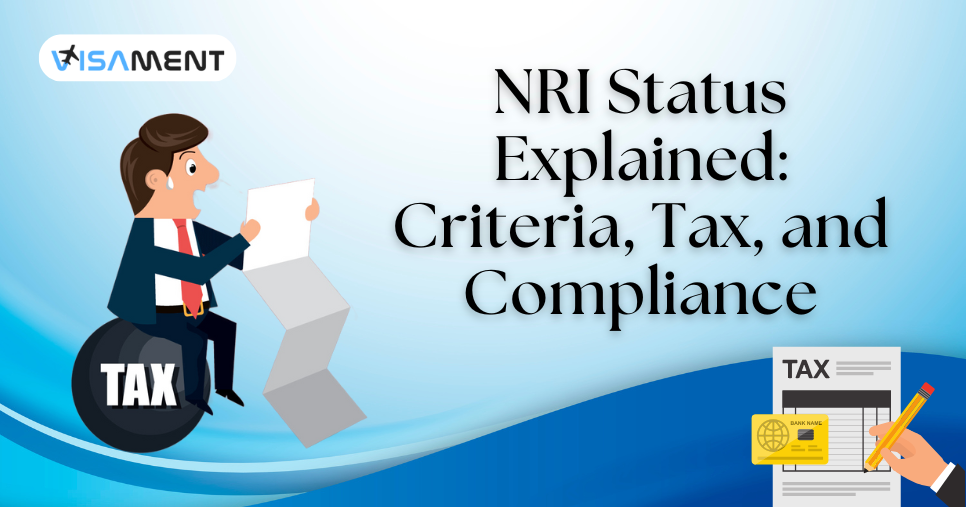- Who is a Resident in India?
- Resident Status of Indian Citizens Leaving Indian for Employment
- Resident Status of an Indian Origin Person and Citizen
- What is a Deemed Resident?
- Who is a Non-Resident of India?
- Residential Status for Taxation in India: Resident vs Non-Resident?
- What are the Rules for Governing NRI Status?
- Residential Status of Indian Citizens as Crew on Indian Ships?
- What Do You Mean By An RNOR?
- What is the Taxable Income of NRI and RNOR?
- Define the Term 'Earned' in India?
- Define the Term 'Accrues in India'?
- Major Deductions for NRI Under Section 80C?
- Get Help with Visament NRI Experts
NRI status under the Income Tax Act, 1961, is divided among the Indians abroad into Resident, NRI, and RNOR based on the duration of their stay in India. The Residents are taxed globally on the income they earn, whereas the NRIs are only taxed on the income they earn in India.
So in this blog, we will go on to see what the NRI status in India is, and how the Residential Status of Indian Citizens is taxed under the Income Tax Act.
Who is a Resident in India?
If any person is in India for more than 182 days or more in a financial year and stayed in India for at least 365 days in the previous 4 years preceding that year with a minimum of 60 days in the year, then it is called a Resident of India for Income tax purposes. The stays can be single visits or counted as multiple visits to India.
Resident Status of Indian Citizens Leaving Indian for Employment
Any person who has gone outside India for work or employment purposes, as a member of the crew on an Indian ship, will have an NRI (Non-Resident Indian)
However, if you stay in India for less than 182 days in the previous year, then you are an Indian citizen, and if you live outside India for a period of 182 days or more, then you will be considered an NRI.
Resident Status of an Indian Origin Person and Citizen
Any person of Indian origin or a Citizen who is outside the Indian country and visits India in the last year. If he or she has a total income of more than 15 lakhs excluding foreign sources of income, then he or she is considered a resident of India for Income Tax purposes. If they:
- Staying in India for more than 182 days or more in a financial year.
- If they are in India for the last 365 days in a period of 4 years preceding that year, and a minimum of 120 days in the last year.
What is a Deemed Resident?
Apart from the condition of the Residents of India above, there is another concept known as a Deemed Resident, which we will cover below.
If any person who is an Indian citizen and has a total annual Income of 15 lakhs, apart from foreign source income, in a fiscal year. In that condition, a person can be called a deemed resident in India if he or she is not a tax resident of any other country in the year.
Who is a Non-Resident of India?
An individual who has not stayed in India for a period of less than 182 days and does not match the above conditions is considered a Non-resident Indian (NRI).
Residential Status for Taxation in India: Resident vs Non-Resident?
Before knowing how much tax you need to pay in India, it is essential to know your residential status in India. It is necessary to review your residence annually.
Your residential status defines your tax liability. Let's assume you are a Non-Resident Indian for one year or more, and you have travelled or shifted from one place to another. You need to check your resident status every year. Before learning about non-resident Indians, it is essential to understand what a resident Indian is.
What are the Rules for Governing NRI Status?
There are mainly two rules for the Non-resident Indians for the NRI status, which are:
- The Income Tax Act helps to govern the tax liabilities of NRIs in India.
- The FEMA (Foreign Exchange Management Act) helps govern all investments, bank account openings of NRIs, and financial transactions of NRIs.
If you look for the definition of NRI, then it is different in these Acts. In this blog, we have only shown you the definition of NRI under the Income Tax Act 1961.
Residential Status of Indian Citizens as Crew on Indian Ships?
If you are a citizen of India and a member of the crew on a ship, then to calculate the period of stay in India, your days of stay in India from the start to the end date for the Continuous Discharge Certificate (CDC) will not be included. You can also use the Residential Status Calculator to determine which category you belong to, such as NRI, RNOR, or Ordinarily Indian Resident (ROR).
Your CDC must be in command of the Merchant Shipping (CDC-cum-Seafaere's identity) Rules, 2001. Under the Merchant Shipping Act, 1958. It should be a long journey starting from an Indian port and ending at a foreign port.
This crew is known as the Non-Resident Indians (NRI) for Income tax purposes if they have spent less than 182 days in India. Suppose we calculate the stay of 182 days. In that case, the whole time should be mentioned in the Continuous Discharge Document, even if the ship is already on its way to the Indian coastal regions in the water.
The days spent on the ship are counted when the ship crosses the Indian coastal boundaries for the outside crew members working on the Indian ships. It is also applicable to Indian citizens or persons of Indian origin who have lived outside India and are visiting India.
The maximum number of days you can stay in India is 182 to maintain your tax residency status as an Indian resident. In some cases, if you have to go to India for a family visit or any other event, then you can get up to 2 months' stay period in India.
Apart from the Resident and Non-Resident Indian categories, there is another category, known as Resident but Not Ordinarily Resident (RNOR). These are the individuals who have spent years abroad and have since Returned to India. For these individuals, we use the term Resident but Not Ordinarily Citizen (RNOR).
What Do You Mean By An RNOR?
If an individual is "Not Ordinarily Resident" of Indian in the given previous year and meets the following conditions, then he or she will be considered as RNOR.
- The person should be eligible to become a resident of India or become a non-resident in India. In which, 9/10 last year's preceding the current financial year, and they should have stayed in India for less than 730 days in the 7 preceding years in the financial year.
- If a person of Indian origin and a citizen of India has a total Income of 15 lakhs apart from the foreign income sources, has stayed in India for more than 120 days but less than 182 days in a financial year, then they are considered as RNOR.
- Every Indian citizen who has a total income of more the 15 lakhs apart from the foreign income sources from the last year, who is deemed to be a resident but not ordinarily resident in India in the considered financial year. If he or she does not have to pay any tax in other countries or regions by domicile, residence, or any similar nature.
What is the Taxable Income of NRI and RNOR?
If you are an NRI and you have a legal income source from where you have 'earned or accrued', in India is taxable. If you generate Income outside Indian, then it will not be taxed in Indian according to the Income Tax Act of India.
The salary of a Non-resident seafarer for the services outside India, on a foreign ship, then it will not be included in your total taxable income in India of the seafarer, even if your salary is credited to your seafarer's NRE account from an Indian bank.
Suppose an individual has stayed for less than 182 days in India for the European seafarer services and gets a salary from the company to his or her NRE Account from the Indian bank. In that case, the total taxable income will not be considered as taxable income in India for the seafarer.
If you are an RNOR and have recently returned to India, then you can keep your RNOR status for 3 years from the date you returned. It allows you to unlock many benefits with you from NRI taxation of the income you have earned outside India. Whether you have returned to India or not, you will not be taxed in India. For an NRI:
- If you have any income in India or have generated a rental income, then you have to pay tax on it in India.
- If you are earning an income from outside India, then you will not have to pay any tax on it while in India.
There is one condition: if you have gotten the status of a resident, all your income generated outside and in India will be taxable in India, unless any concessions are made under the Double Taxation Avoidance Agreement (DTAA) between India and your overseas country.
Define the Term 'Earned' in India?
The term 'Earned' means if you get any income in India under the Indian law, which is received in India by you or from someone on your behalf.
Any income that accrues or arises in India or any income that lawfully accrues or arises in India.
Define the Term 'Accrues in India'?
According to section 9 of the Income Tax Act. (It applies to everyone who is getting income accrued or arising, regardless of their residential status).
If your answer is yes to any of the following points given below, then your income will be considered accrued in India.
- If you get income from a business in India.
- Dividend paid by the Indian company, whether received outside or inside India.
- If you get a salary for services provided in India.
- Getting income from any property or asset in India.
- If you get income from the salary that you get from the Government of India for services provided outside India, when you are a citizen of India.
- If you acquire capital gains on the transfer of a capital asset located in India.
- Getting interest, royalty, or technical fees from the central or state government or from the designated person in certain circumstances.
Major Deductions for NRI Under Section 80C?
Here are some of the major deductions that NRIs can get under Section 80C at the time of filing Income Tax returns.
- For the payment of the Life Insurance premium.
- Kids' tuition fees payment.
- Investment in ELSS.
- Payment for the unit-linked Insurance Plan (ULIP).
- Payment of the outstanding loan taken for purchasing a residential property and for construction.
In some Sections, such as 80G, 80D, 80TTA, 54EC, and Section 54, NRI can get deductions.
Get Help with Visament NRI Experts
In this blog, we have seen what the NRI status and taxation are under the Income Tax Act, 1961. It is divided into different categories, like Resident of India, Non-resident Indians (NRI), and Resident but Not Ordinarily Resident (RNOR). We hope that this blog will help the NRIs and RNOR residents who are taxable in India, and other residents who go to foreign countries for work, study, or business purposes. For more information on the NRI status and residency rules, you can contact our Visament experts from the online website. They are 24/7 available to help you related to your queries and doubts.
Frequently Asked Questions
Yes, an NRI can own a property in India. They can buy both residential and commercial property in India. However, purchasing agricultural land, plantation property, or farmhouses is not allowed.
Yes, an NRI can operate a bank account in India. They can operate NRE (Non-Resident External) and NRO (Non-Resident Ordinary) accounts in India.
If you spend more than 182 days outside of India within a fiscal year (April–March), you are considered an NRI. Even a partial day spent in India counts. The barrier can be 240 days for people departing for work or as ship crew. To confirm your status, keep track of your travels.
Yes, NRIs are eligible for Aadhaar cards. If an NRI has stayed in India for 182 days or more in the 12 months after the date of application, then they can apply for an Aadhaar card.
The ITR forms for NRIs vary according to their income sources. ITR-2 is for all types of income except business income. ITR-3 is for business income.
No, NRIs cannot hold, open, or operate a resident account in India. According to the FEMA, NRIs must either close or convert their savings or current account to an NRO or NRE account.

_1742386512.webp)









